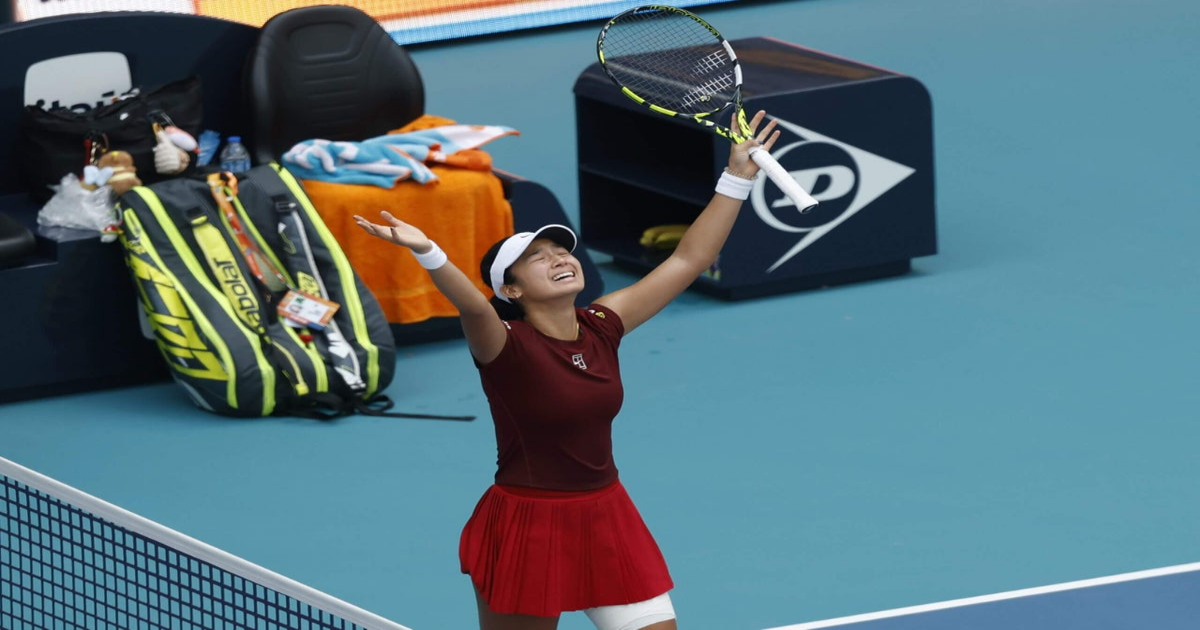MIAMI — Alexandra Eala cannot be stopped.
For a third consecutive match, Eala, a 19-year-old wild card from the Philippines, has beaten a Grand Slam champion. This time, she has beaten the most dominant one of the past three years, toppling Iga Świątek 6-2, 7-5.
Świątek, the five-time Grand Slam champion and world No. 2, struggled with her serve, allowing Eala to push forward and stand either on or inside the baseline for most of the match. Świątek also couldn’t figure out the riddle of Eala’s serve, a spinning, left-handed offering that just barely cracks 90 mph on the first ball and travels at roughly 75 mph on the second.
Whatever Eala lacks in obvious power, she has made up for with quick feet and hands and healthy doses of gumption, especially on the most crucial points. Time and again, she stood her ground and absorbed Świątek’s power and spin. She short-hopped the ball to take time away from her opponent, or took a big cut at balls that kicked off the court and bounced up around her eyes. The strategy rushed Świątek’s preparation, especially on her forehand, forcing her to rush shots that floated off the court or gave Eala an opportunity to put the next ball away. Świątek hit 32 unforced errors to Eala’s 12.
Świątek had received additional security earlier in the tournament, after a man harassed her during practice before her victory over Elina Svitolina. The result still continues a year of frustration for the former world No. 1, who has not won a title since last year’s French Open. Three of her four losses at the tournaments before this one in 2025 came at the hands of the eventual champion — Mirra Andreeva in Dubai, United Arab Emirates and Indian Wells, Calif., and Madison Keys at the Australian Open. Andreeva and Keys are both top-10 players, and her other defeat came to Jelena Ostapenko, an opponent she has never beaten.
In every match, Świątek faced an opponent playing something close to the match of her life, but Eala was playing the match of her life for the third time in a row in a week. She was also the world No. 140 — at least until next week, when she will break the top 100 for the first time, ranked at least No. 75.
After being overrun in the first set, Świątek served for the second, but Eala hit a nifty drop shot to get to double break point and then got Świątek to send another forehand wide to draw even at 5-5. Eala held serve once more, and in the decisive game, two forehand errors from Świątek — one into the net and one long — got Eala to within two points of victory. Świątek then framed another forehand, shanking it high and long. On match point, it was the backhand that went long.
Eala stood still behind the baseline, her face still with shock.
After shaking hands she walked to the center of the court and choked back tears, staring at the crowd and the giant images of herself on the massive screens in the corners of the stadium.
“I’m just in disbelief right now,” Eala said on court.
“It’s so surreal … I’m so happy and so blessed to be able to compete with such a player on this stage.”
Eala’s run in Miami was already ridiculous. After beating Katie Volynets to start, she beat former French Open champion Ostapenko in the second round and reigning Australian Open champion Keys in the third. She got a break in the round of 16, when Paula Badosa withdrew with a back injury.
Knocking off Świątek, even the version of her prone to playing tight against players who walk onto the court with little to lose, is on a different level. Świątek generally destroys inexperienced opponents like Eala, getting a sniff of a lead and then running into the distance.
But each time she appeared to be shaking off the nerves and going on one of her patented rolls, Eala stepped in and took her shots. This wasn’t simply a matter of forcing Świątek to hit one more shot; it was a 19-year-old finding the lines and angles that had Świątek’s head on a swivel as she watched ball after ball fly past her. Eala, more typically a counterpuncher, reached for the strategy of all-out aggression that other players have found disrupts Świątek. She executed it with aplomb.
She won 77 points to 59 for Świątek. She won 43 of those points while returning serve. She won eight of 10 break points. It doesn’t get much better than that.
Her win once more puts her in uncharted territory for a tennis player from the Philippines. She was already the highest-ranked Filipino in WTA Tour history, and the first to win a junior Grand Slam, the U.S. Open in 2022. Now she is in a semifinal at the 1,000-level event, one rung below a Grand Slam. The Philippines has three top-30 wins since WTA rankings began in 1975; Eala has all three.
U.S. Open finalist Jessica Pegula or 2021 U.S. Open champion Emma Raducanu are next in line to face Eala.
(Photo of Alex Eala: Geoff Burke / Imagn Images)
